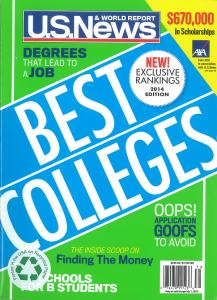 Most parents are thinking about their child’s collegiate future from the moment they enter high school, if not before. Some students are proactive about choosing a dream college and back-up options, while others need extra guidance from their parents to make those decisions. And regardless of whether your child is applying to one school or ten, the application process and months leading up to it are probably stressful for you as well!
Most parents are thinking about their child’s collegiate future from the moment they enter high school, if not before. Some students are proactive about choosing a dream college and back-up options, while others need extra guidance from their parents to make those decisions. And regardless of whether your child is applying to one school or ten, the application process and months leading up to it are probably stressful for you as well!
You want to make sure they do their best work throughout their high school years, building up the knowledge and experience that will serve them in college, plus that they’ll put their best foot forward with the application process to increase their chances of being accepted. If this sounds like something you’re experiencing, here are some helpful tips you can follow to help your child prepare and be successful.
1. Find a volunteering opportunity to share with your child.
The benefits of volunteerism are plentiful. Kids who volunteer learn about an important social cause and that they have the ability to make a positive impact on the world around them, even in a small way. It’s a great bonding experience for parents and children to do together. It also makes a meaningful addition to any resume.
2. Help your child raise low grades.
Tutoring is a great resource for students of all ages. Tutors are trained to help students study and learn specific subject matter plus develop learning strategies that they can employ in the future. Students who partner with a tutor not only have the opportunity to bring up their grades, but to value the importance of working to overcome difficulties. They also learn that they are capable and competent learners, even in subjects that don’t come naturally to them.
3. Encourage your child to pursue a passion.
High school students have a lot to focus on as they prepare for college life. Many juggle schoolwork with part-time jobs, obligations at home, and time with friends. They can improve their quality of life and maybe even open the door for new opportunities in the future by pursuing a hobby with fervor and merging it with their academic interests. For example, if they love skateboarding, help them look for opportunities to take that interest to the next level. Are there any local competitions at which they can volunteer their time or a skate shop where they can work a day or two a week? If they’re an aspiring writer, can they volunteer to write an article for a local publication about the skating community where you live? Your child will appreciate the support you provide and feel empowered to pursue things that are of interest to them.
Most parents will attest to the fact that the best approach to take as you help your child prepare for college is to be their partner in the process. Consider their natural talents and interests, and help them get the support they need to excel in those areas that they find more challenging. By being a strong support system for them, you’ll be able to give them the extra tools and guidance they need to choose and be accepted into an excellent college.
______________________________
 Dusty Fox is a full-time world traveler and freelance writer who contributes to the Ivy Trainers network. Visit the Ivy Trainers website to learn more about the services they offer.
Dusty Fox is a full-time world traveler and freelance writer who contributes to the Ivy Trainers network. Visit the Ivy Trainers website to learn more about the services they offer.



 U.S. News released their
U.S. News released their 





